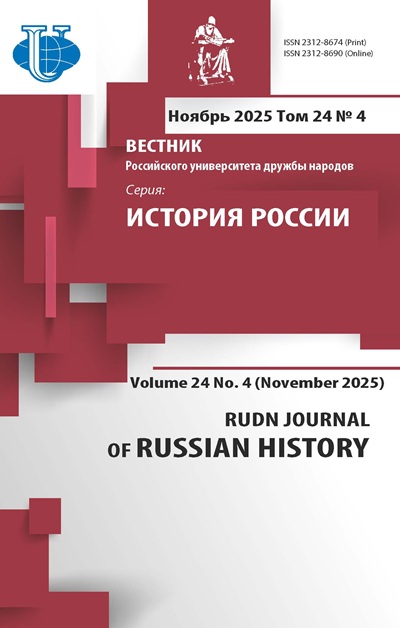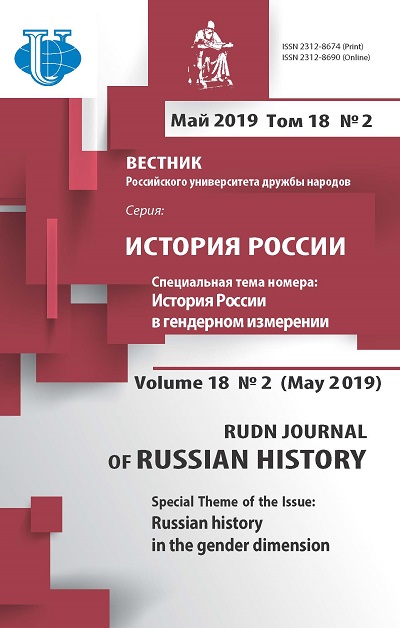«Труд как свобода, труд как бремя»: o ранних страницах женской занятости в России
- Авторы: Морозова О.М.1, Трошина Т.И.2,3, Ялозина Е.А.4
-
Учреждения:
- Донской государственный технический университет
- Северный (Арктический) федеральный университет имени М.В. Ломоносова
- Северный государственный медицинский университет
- Финансовый университет при Правительстве Российской Федерации
- Выпуск: Том 18, № 2 (2019): История России в гендерном измерении
- Страницы: 374-411
- Раздел: ЖЕНЩИНА В ТРУДЕ
- URL: https://journals.rudn.ru/russian-history/article/view/21200
- DOI: https://doi.org/10.22363/2312-8674-2019-18-2-374-411
- ID: 21200
Цитировать
Полный текст
Аннотация
В данной статье авторы ставят целью показать процесс оформления типа российской работающей женщины, занятой в сферах, требующих умственного квалифицированного труда в период со второй половины XIX в. до 30-х гг. ХХ века. В России образованные женщины вошли в сферу общественно значимого труда во время Великих реформ. Пройденный с тех пор путь во многом объясняет положение работающей женщины в современной России, что актуализирует избранную авторами проблему исследования. Источниками для написания статьи стали делопроизводственные документы учреждений царского и советского времени, статистические сведения, материалы печати, мемуары. Среди факторов, повлиявших на формирование класса работающей россиянки в дореволюционный период, авторы выделяют общественное движение за развитие женского образования, появление специальных женских учебных заведений профессионального образования, земскую реформу, промышленную индустриализацию и, наконец, Первую мировую войну. В статье показаны изменения в характере занятости советской женщины после революции 1917 г. При этом авторы приходят к выводу о том, в 1920-е гг. не произошло коренных изменений в условиях быта, и в результате советская женщина-интеллигентка оказалась «бойцом двух фронтов» - трудового и бытового. В 1930-е гг. авторы фиксируют бурный рост женского участия во всех сферах народного хозяйства СССР, среди которых лидирующими стали здравоохранение, образование и работа в аппарате советских, партийных и хозяйственных органов. В результате в этот период окончательно сформировались профессиональные черты трех основных групп советской работницы: женщины-врача, женщины-учителя и женщины-функционерки.
Об авторах
Ольга Михайловна Морозова
Донской государственный технический университет
Автор, ответственный за переписку.
Email: olgafrost@gmail.com
доктор исторических наук, профессор кафедры «Связи с общественностью» Донского государственного технического университета
344000, Россия, Ростов-на-Дону, пл. Гагарина, 1Татьяна Игоревна Трошина
Северный (Арктический) федеральный университет имени М.В. Ломоносова; Северный государственный медицинский университет
Email: tatr-arh@mail.ru
доктор исторических наук, профессор кафедры социальной работы и социальной безопасности САФУ
163000, Россия, Архангельск, Троицкий пр-т, 51Елена Алексеевна Ялозина
Финансовый университет при Правительстве Российской Федерации
Email: EAYalozina@fa.ru
кандидат исторических наук, доцент Департамента социологии, истории и философии Финансового университета при Правительстве Российской Федерации
125993, Россия, Москва, Ленинградский просп., 49Список литературы
- Артемов С. Жизнь и смерть за копейку // Личное дело. 2002. № 6 (51). URL: http://www.prpc.ru/ gazeta/51/copeck.shtml (дата обращения: 21.07.2016).
- Белова Н.А. Повседневная жизнь учителей. М.: ИЭА РАН, 2015; Юинг Э.Т. Учителя эпохи сталинизма: власть, политика и жизнь школы 1930-х гг. М.: РОССПЭН, 2011.
- Груздева Е.Б., Чертихина Э.С. Труд и быт советских женщин. М.: Политиздат, 1983.
- Днепров Э.Д., Усачева Р.Ф. Женское образование в России. М.: Дрофа, 2009.
- Жбанков Д.Н. Русская женщина-врач. Практический врач // 1913. № 14. С. 216; № 15. С. 233.
- Зеликсон-Бобровская Ц. За первые 20 лет: Записки рядового подпольщика. М.: Старый большевик, 1932.
- Зимин И.В. Женское медицинское образование в России (вторая половина XVIII - начало ХХ в.).Дисс. … к.и.н. СПб: [Б.и.], 1999.
- Иохельсон В. Геся Мироновна Гельфман. Биографический очерк. URL: http://saint-juste.narod.ru/ Gelfman.htmlк_ftnrefXIII (дата обращения: 14.04.2016).
- Ковалева М.Д. Женщины в медицине: монография. Волгоград: изд-во ВолГУ, 2004.
- Козлинина Е.И. За полвека. 1862-1912 гг.: Воспоминания, очерки и характеристики. М.: Тип. ТД Н. Бердоносов, Ф. Пригорин и Ко, 1913.
- Кошель П. История сыска в России. Минск: Литература, 1996. URL: http://www.gumer.info/bibliotek_ Buks/History/koshel/05.php (дата обращения: 7.06.2016).
- Кизеветтер Е.Я. Дневник 1905-1907 гг. Российский архив. Т. 5. М.: Студия ТРИТЭ, 1994. Луначарский А.В. О народном образовании. М.: Изд-во Акад. пед. наук РСФСР, 1958. С.139.
- Морозова О.М., Трошина Т.И. Красные делегатки как вариант советского феминизма // Адам & Ева.Альманах гендерной истории. 2014. № 22. С. 124-146.
- Пушкарёва Н.Л., Мицюк Н.А. Повивальные бабки в истории медицины России (XVIII - сер. XIX вв.) // Вестник Смоленской государственной академии. 2018. Т. 17. № 1. С. 179-189.
- Пушкарёва Н.Л., Мицюк Н.А. У истоков медикализации: основы российской социальной политики в сфере репродуктивного здоровья (1760-1860 гг.) // Журнал исследований социальной политики. 2017. Т. 15. № 4. С. 515-530.
- Солодянкина О.Ю. Гувернатки в русских дворянских семьях // Вестник РУДН. Серия: История России. 2003. № 2. С. 38-44.
- Суслова А.П. Годы близости с Достоевским: Дневник-повесть-письма. Репринт. М.: РУССЛИТ, 1991.
- Стайтс Р. Женское освободительное движение в России. Феминизм. Нигилизм и большевизм 1860-1930. М.: РОСCПЭН, 2004.
- Холмс Л. Школьная реформа сверху и снизу: комплексный метод // Советская педагогика. 1990. № 3.С. 118-124.
- Холмс Л. Социальная история России: 1917-1941. Ростов н/Д.: РГУ, 1994.
- Ялозина Е.А. Повседневность сельского учительства в 1920-е гг. // Преподавание истории в школе.2011. № 1. С. 74-77.
- Ялозина Е.А. Социально-экономические проблемы развития отечественной школы в 1920-е гг.: государственная политика и историческая реальность. Ростов н/Д: ИПО ПИ ЮФУ, 2009.
- Pushkareva N.L. Russian Feminism. Two centuries of history in L’homme // Übergänge. Ost-West-Feminismen 2006. Vol. 6, № 1. Р. 7-11.
- Pushkareva N.L. Clever but Poor. Women-Scientists in Post-Soviet Folklore // Българска етнология. 2007.№ 2-3. С. 37-56.
- Pushkareva N.L. Women’s History in Russia: Status and Perspective between Eastern Traditionalism and Western Feminism // Post-Communist Transition and Women’s Agency in Eastern Europe Central and East European Studies Series. Dordrecht: Republic of Letters, 2014. Р. 27-39.
- Pushkareva N.L. Privated and Public Aspects Daily Life of the First Russian Women Historians (1810- 1914) // Revue de l’Institut des Langues et Cultures d’Europe, Amerique, Afrique, Asie et Australie. 2017. № 29. Р. 3-13.
- Pushkareva N.L. “Women Scientists Resemble Guinea Pigs…” Anecdotes about Women-Scientists in Soviet and Post-Soviet Russia // Gender Forum. 2011. № 33. Р. 52-64.
- Ruane C. Gender, Class, and the Professionalization of Russian City Teachers, 1860-1914. Pittsburgh: University of Pittsburgh Press, 1994.
- Tevlina V.V. “Formation of an Educational and Training System for Social Work in the Russian Empire, 1860s to the early 1900s // Social History. 2008. № 3. Р. 299-316.
Дополнительные файлы















